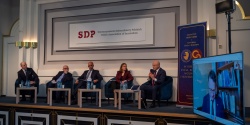Published: 09.04.2025

• On April 8, the Ordo Iuris Institute presented the Polish version of a document with proposals for reforming the European Union, prepared jointly with Hungary’s Mathias Corvinus Collegium (MCC).
• The publication includes a diagnosis of the current situation and two scenarios for action to restore the Union to its original character as a community of sovereign nation-states.
• Experts from Poland and Hungary spoke at the presentation held in Warsaw, discussing decisions of EU institutions that undermine the sovereignty of member states and pointing out ways to protect the interests of nation-states.
• Earlier, the report was also presented in Washington and Budapest.
A Polish presentation of preliminary proposals for reform of the European Union, developed by the Ordo Iuris Institute and Hungary's Mathias Corvinus Collegium (MCC), took place in Warsaw on April 8. Partners in the project are the Schuman Thought Institute from Poland and the Center for Fundamental Rights from Hungary. The document was drafted following a conference co-organized last September in Warsaw by the Ordo Iuris Institute and America’s Heritage Foundation. Organizations from across the European Union (EU), with whom discussions are ongoing—and most of whom participated in the September conference—are to be involved in further work on preparing a detailed draft amendment to the EU treaties. The initiative came in response to the procedure for reforming the EU treaties toward greater centralization, launched in November 2023 by the European Parliament.
The authors of the publication "The Great Reset: Restoring the Sovereignty of Member States in the European Union" propose two different scenarios for EU reform. The first involves amendments to the EU treaties that implement 23 proposals to reassess and realign executive, legislative, and judicial powers while empowering nation-states, constitutions, and governments. If this reform cannot be pushed through due to time, cost, or the resistance it encounters, the second option suggests dissolving the EU and resuming cooperation among European states on a voluntary basis, in line with the principles guiding the proposed reforms.
The report has already been translated from English into Polish and Hungarian, and—independently of the authors—into French, Spanish, and Italian. Yesterday’s discussion on its contents included the authors of the publication—attorney Jerzy Kwaśniewski (President of the Ordo Iuris Institute), Dr. Jarosław Lindenberg (diplomat, former Deputy Foreign Minister), and Rodrigo Ballester (Director of the MCC Center for European Studies)—as well as its reviewer, Prof. Ryszard Legutko. The panel also included Confederation MEP Anna Bryłka (Patriots for Europe) and Law and Justice MP Marcin Romanowski, a former Deputy Minister of Justice, who participated remotely from Hungary, where he was granted asylum last December (see here why).
The discussion was summarized by Ryszard Krzyżkowski, Chairman of the Board of the Schuman Thought Institute (Instytut Myśli Schumana).
Deputy Speaker of the Sejm Krzysztof Bosak, who was present in the audience, also joined the discussion at the end, praising the initiative of the document’s authors and offering his own comments on their proposals.
The Warsaw presentation of the report was opened by attorney Jerzy Kwaśniewski. The president of Ordo Iuris noted that the publication was met with opposition from left-wing circles pushing for increasing centralization of the European Union.
“The noticing of our report by supporters of the European superstate, preceded by the clear voice of Anne Applebaum or [Foreign Minister] Radosław Sikorski attacking the authors of the report, means that there is a need to present a concrete offer of EU corrections—or a concrete offer of a completely new entity that can replace the EU,” the co-author of the report pointed out.
Rodrigo Ballester, also one of the authors of the publication, noted that in the European Union any criticism of the current system and the centralizing tendencies of the EU institutions is being silenced.
“Anything that is not about centralization or federalization is considered sacrilege, blasphemy. The European Union is no longer a pragmatic way of connection and cooperation between European nations, but it is supposed to be one cult that must not be criticized,” said the director of the Center for European Studies at Mathias Corvinus Collegium.
In turn, Prof. Ryszard Legutko, a former MEP and reviewer of the report, stressed that the system of EU institutions is already “derailed.” In his view, the only way to rectify the situation is to mobilize citizens and put pressure on those in power.
“The only way is pressure from the member states, social pressure, citizen pressure. We have to realize that the percentage of people who are dissatisfied with the direction the EU has gone and want change is quite large. Only this requires organization and coordination, and it is good that this is happening. This is one of the moves that are necessary,” he pointed out.
Prof. Legutko also noted that the EU institutions are a source of processes contrary to democratic principles, increasingly affecting individual member countries.
“The European Union is at the moment the main breeding ground for lawlessness in Europe. What we are seeing recently in France, in Romania, what is happening in Poland—this actually started earlier in the European Union. We have been observing it in the European Parliament,” he said.
Another co-author of the publication under discussion, Dr. Jarosław Lindenberg—a long-time diplomat—also spoke. He pointed out the tendencies of the EU institutions to restrict civil liberties. He stressed that these are a consequence of the Union taking the direction set by communist Altiero Spinelli in the Ventotene Manifesto.
“The EU economy is so over-regulated that it no longer has freedom. It is over-regulated in the name of leftist, insane climate and other ideologies. There is no individual freedom—it has also been taken away from us through the reign of the very ideologies that dominate political life. These are neo-Marxist ideologies: LGBT, gender, wokeism,” the former Deputy Foreign Minister noted.
MEP Anna Bryłka, meanwhile, pointed to the European Union’s use of crisis situations to further restrict the sovereignty of member states.
“The extra-treaty appropriation of more competencies by the European Union is leading to nation-states slowly losing any tools they have to influence Union policy. This is shown by every crisis that arises in the world. We had a pandemic in 2020, now we have a crisis in relations with the U.S. administration, the war in Ukraine. Once again, these crises are being used by the European Union to create a European superstate,” she stressed.
In turn, MP Marcin Romanowski pointed out the importance of cooperation among member states—especially from the Central European bloc—to counter centralizing trends in the EU.
“It is worth thinking in terms of joint alternative solutions. I treat Central European cooperation, for example, precisely in these terms. Of course, I’m not talking here—at least for now—about some real possibilities of creating a certain community of an economic nature. But for me, it’s quite real to work out a certain agreement based precisely on these real values of European civilization. Such an agreement on the protection of human rights in Central Europe could be a certain alternative to Strasbourg,” the former Deputy Justice Minister said.
The discussion was summarized by Ryszard Krzyżkowski, President of Poland’s Schuman Thought Institute (Instytut Myśli Schumana), which was a partner in the release of the report. He stressed that the Institute favors one of the two scenarios proposed in the report—namely, the dissolution of the European Union and the resumption of cooperation between the countries of Europe on a voluntary basis.
“An authentic community is based on concrete common values, and we, as European countries, mostly lack such values. On the other hand, at present, in a situation of ideological war, it is impossible to build any well-functioning institution,” he pointed out.
In conclusion, Deputy Speaker of the Sejm Krzysztof Bosak spoke. In his opinion, the report prepared by Ordo Iuris and MCC has the potential to convince politicians to courageously defend the sovereignty of their countries.
“As a tool for activating the political thinking of all those who are afraid to think about regaining their independence, such proposals can have an extremely good value. We need as many politicians as possible in European countries to move from positions supporting the centralization of the European Union to positions defending sovereignty. Regardless of where they envision this desired stage of sovereignty, the point is that they simply need to gain courage—and such proposals can help with that,” noted the politician, a nationalist leader of the right-wing Confederation alliance, which brings together Christian nationalists and libertarians and positions itself to the right of Law and Justice, a social-conservative, Christian democratic party.
This was the third presentation of the report, following Washington and Budapest. The publication is also scheduled to be presented in Madrid, Rome, and Brussels. Its presentation in Paris is also under consideration.

• The pressure on the European Union’s southern borders has continued unabated since the great migration crisis of 2015.

23.05.2025
We are currently engaging with think tanks and political parties across the continent to collaboratively develop a detailed counter-proposal to the centralist, anti-national, and anti-democratic vision of the European Union promoted by the European Parliament and President Macron.

19.05.2025
• The 78th World Health Assembly, the deliberative body of the World Health Organization, begins today in Geneva.

16.05.2025
On 13 May 2025, James Daniel Jordan, Chairman of the Judiciary Committee of the United States House of Representatives, together with four other members of the Committee, addressed a letter to Michael McGrath, European Commissioner for democracy, justice and the rule of law. The letter inquires how the European Union intends to respond to the actions of Donald Tusk’s government.